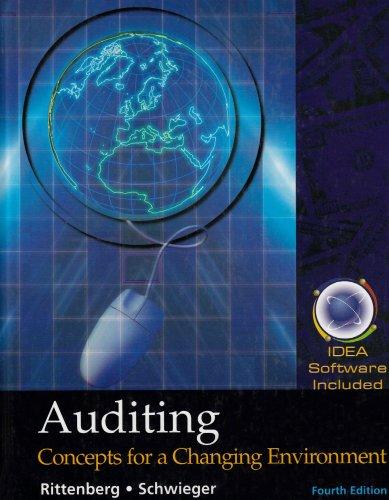Kent, CPA, is the engagement partner on the financial statement audit of Super Computer Services Co. (SCS)
Question:
Kent, CPA, is the engagement partner on the financial statement audit of Super Computer Services Co. (SCS) for the year ended April 30, 2002. On May 6, 2002, Smith, the senior auditor assigned to the engagement, had the following conversation with Kent concerning the planning phase of the audit:
Kent: Do you have all the audit programs updated yet for the SCS engagement?
Smith: Mostly. I still have work to do on the fraud risk assessment.
Kent: Why? Our “errors and irregularities” program from last year is still OK. It’s passed peer review several times. Besides, we don’t have specific duties regarding fraud. If we find it, we’ll deal with it then.
Smith: 1 don’t think so. That new CEO, Mint, has almost no salary, mostly bonuses and stock options. Doesn’t that concern you?
Kent: No. The board of directors approved Mint’s employment contract just three months ago. It was passed unanimously.
Smith: I gues’ so, but Mint told those stock analysts that SCS’s earnings would increase 30 percent next year. Can Mint deliver numbers like that?
Kent: Who knows? We’re auditing the 2002 financial statements, not 2003. Mint will probably amend that forecast every month between now and next May.
Smith: Sure, but all this may change our other audit programs.
Kent: No, it won’t. The programs are fine as is. If you find fraud in any of your tests, just let me know. Maybe we’ll have to extend the tests. Or maybe we’ll just report it to the audit committee.
Smith: What would they do? Green is the audit committee’s chair, and remember, Green hired Mint. They’ve been best friends for years. Besides, Mint is calling all the shots now. Brown, the old CEO, is still on the Board, but Brown’s never around.
Brown’s even been skipping the board meetings. Nobody in management or on the Board would stand up to Mint.
Kent: That’s nothing new. Brown was like that years ago. Brown caused frequent disputes with Jones, CPA, the predecessor auditor. Three years ago, Jones told Brown how ineffective the internal audit department was then. Next thing you know, Jones is out and I’m in. Why bother? I’m just as happy that those understaffed internal auditors don’t get in our way. Just remember, the bottom line is. . . are the financial statements fairly presented? And they always have been. We don’t provide any assurances about fraud. That’s management’s job.
Smith: But what about the lack of segregation of duties in the cash disbursements department?
That clerk could write a check for anything. , Kent: Sure. That’s a reportable condition every year and probably will be again this year. But we’re talking cost-effectiveness here, not fraud. We just have to do lots of testing on cash disbursements and report it again.
Smith: What about the big layoffs coming up next month? It’s more than a rumor.
Even the employees know it’s going to happen, and they’re real uptight about it.
Kent: I know; it’s the worst-kept secret at SCS, but we don’t have to consider that now.
Even if it happens, it will only improve next year’s financial results. Brown should have let these people go years ago. Let’s face it, how else can Mint even come close to the 30 percent earnings increase next year?
Required:
a. Describe the fraud risk factors that are indicated in the dialogue.
b. Describe Kent’s misconceptions regarding the consideration of fraud in the audit of SCS’s financial statements that is mentioned in the dialogue. Explain why each is a misconception.
Step by Step Answer:

Auditing Concepts For A Changing Environment With IDEA Software
ISBN: 9780324180237
4th Edition
Authors: Larry E. Rittenberg, Bradley J. Schwieger





